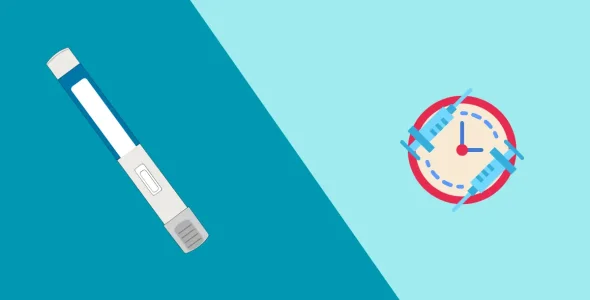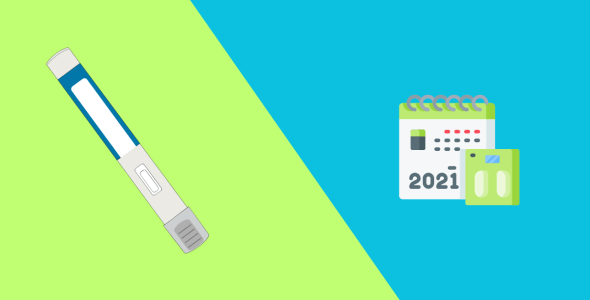Semaglutide + B12 dosage chart for weight loss
Your personalized semaglutide + B12 dosage chart is the roadmap to your weight loss success. Inside, you’ll find a detailed titration schedule, expert tips for managing side effects, and the key questions to ask your provider.
Key highlights
- Semaglutide with vitamin B12 is an emerging approach to weight loss that may help individuals counteract the side effects of semaglutide, such as fatigue and low energy levels.
- Semaglutide is started at a low dose, and its dosage is increased gradually during the titration phase to minimize the risk of side effects and give your body enough time to adjust. Some sensitive patients may benefit from microdosing (below 0.25 mg) or customized compounded formulations to improve tolerance.
- Compounded semaglutide with Vitamin B12 is not an FDA-approved formulation. You should use this combination only when prescribed by a healthcare provider to ensure safety and effectiveness.
- Avoid using semaglutide or its combination with vitamins if you have a history of thyroid cancer, pancreatitis, severe gastrointestinal disorders, or multiple endocrine neoplasia type 2 (MEN2).
Semaglutide has gained significant popularity in recent years due to its ability to promote weight loss. Recently, a new trend of prescribing vitamin B12 with semaglutide has emerged in medical spas and weight loss clinics. A combination of vitamin B12 with semaglutide may help counteract the side effects of semaglutide, such as fatigue, low energy, or nutrient depletion.
Semaglutide is a glucagon-like peptide 1 (GLP-1) agonist that mimics the action of the naturally occurring GLP-1 hormone. The medication works by increasing insulin secretion, decreasing the glucagon release, and slowing gastric emptying to suppress appetite, control blood glucose levels, and promote weight loss. The medication is available under three brand names: Ozempic, Wegovy, and Rybelsus. Compounded semaglutide + B12 is a custom-formulated medication and is not the same as the brand-name medication. Although semaglutide is an effective medication for weight loss and blood sugar control when used along with lifestyle changes, it can cause side effects such as gastrointestinal problems, reduced appetite, fatigue, nutritional deficiencies, and low energy. Vitamin B12 is an essential nutrient that helps in energy production, red blood cell synthesis, and the regulation of the nervous system. When clinically appropriate, this vitamin may be added to semaglutide to support weight loss while reducing fatigue, combating vitamin B12 deficiency, and improving energy levels.
This article explains how semaglutide affects digestion and nutrient absorption, how vitamin B12 may support energy levels, current dosing practices for a combination of vitamin B12 and semaglutide, potential risks, and how to use it safely under medical guidance.
Why is semaglutide combined with B12?
Semaglutide (Wegovy and Ozempic) is an FDA-approved GLP-1 agonist that is used to treat obesity, type 2 diabetes, and weight-related health conditions such as metabolic dysfunction-associated steatohepatitis (MASH). In clinical studies, this medication has also shown benefits in reducing the incidence of major cardiovascular events in patients with or without type 2 diabetes.
The purpose of combining semaglutide with vitamin B12 is to improve tolerance, enhance energy levels, and promote overall health.
This combination is supposed to offer the following potential benefits:
Vitamin B12 may help mitigate nausea, fatigue, and general weakness, which are common side effects of semaglutide. Although further research is ongoing, research studies show that vitamin B12 deficiency itself can cause pronounced exhaustion and fatigue. As semaglutide can cause nutritional deficiencies such as vitamin B12 deficiency, many clinicians believe that maintaining optimal B12 levels can reduce fatigue, improve tolerance, and promote overall health during semaglutide therapy.
Vitamin B12 has a crucial role in red blood cell production, nerve function, and overall metabolism. Research studies show that vitamin B12 is essential for DNA synthesis and cellular energy production. Therefore, it works as an energy enhancer and endurance booster. Since a weight loss journey can be exhausting, adding vitamin B12 helps counteract the potential fatigue, which is a common side effect of consuming a low-calorie diet. This combination ensures sustained energy levels throughout the treatment.
How semaglutide can affect B12 absorption
As semaglutide works by slowing gastric emptying and promoting the feeling of satiety (reduced cravings) for weight loss, it may influence the body’s ability to absorb certain nutrients, including vitamin B12. However, evidence from research studies suggests that GLP-1 analogs may also reduce gastric acid secretion, which can impair the conversion of dietary B12 into its absorbable form and decrease binding to intrinsic factor, both of which are necessary for proper absorption. In addition, it is also hypothesized that altered gastric physiology may indirectly reduce intrinsic factor levels. These mechanisms have not been proven yet.
Several factors can increase the likelihood of developing a vitamin B12 deficiency. These include:
- Metformin use: Metformin impairs vitamin B12 absorption in the intestine. If you use semaglutide along with metformin, you may develop a vitamin B12 deficiency.
- Older adults: Older adults are more prone to developing vitamin B12 deficiency because stomach acid and intrinsic factor production naturally decline with age.
- Gastric or bariatric surgery: Patients who have undergone weight loss surgeries such as gastric or bariatric surgery may experience B12 deficiency due to the unavailability of intrinsic factor after gastric or intestinal resection.
- Vegan diet: The main sources of vitamin B12 are animal-based products such as meat, fish, eggs, and dairy. Individuals who follow a vegetarian or vegan diet often have low dietary intake of B12, which can result in vitamin B12 deficiency.
- Semaglutide use: Semaglutide itself slows gastric emptying, which may indirectly impair your body’s ability to absorb vitamin B12, leading to a vitamin B12 deficiency.
Vitamin B12 deficiency can present with a range of physical and neurological symptoms. These include:
- Fatigue, weakness, and pallor are the most common symptoms that appear in the early stages. They occur due to megaloblastic anemia resulting from impaired red blood cell formation.
- Neurological symptoms such as numbness, tingling in the hands or feet, muscle weakness, balance problems, or difficulty walking can occur.
- Cognitive and psychological problems such as memory loss, confusion, irritability, or depression appear after prolonged deficiency of vitamin B12.
- Mucosal changes like sore tongue, mouth ulcers, or glossitis are also common with vitamin B12 deficiency.
Standard compounded semaglutide + B12 dosage chart
Semaglutide is available in the form of a pre-filled pen (subcutaneous injection), which is injected under the skin. You can inject the medication under the skin of your abdomen, thighs, or upper arm. It’s important to rotate injection sites each time to avoid skin irritation and infections.
Compounded semaglutide + B12 typically comes in different doses ranging from 0.25 mg to 2.5 mg once weekly. Semaglutide therapy is initiated at a low dose, and the dose is increased gradually to allow the body to adjust to the medication. This process is known as titration. The primary goal of titration is to reduce the severity of gastrointestinal side effects, such as nausea, vomiting, bloating, or diarrhea, which are most common when you start treatment or increase the dosage. Additionally, it gives your body enough time to adjust to the medication. Your healthcare provider will assess your body’s tolerance at every step and adjust the dosage accordingly.
Compounded semaglutide with vitamin B12 comes in customized doses and formulations. You can get the standard and microdoses of semaglutide from compounding pharmacies, if a licensed healthcare provider determines it’s clinically appropriate. The general dosing schedule of compounded semaglutide with vitamin B12 is as follows:
| Phase | Weeks | Typical Dosage | What to Expect |
|---|---|---|---|
| Initiation Phase | Weeks 1–4 | 0.25 mg semaglutide / 0.25 mcg B12 | This is the initial dose. You may experience minor nausea or appetite suppression. |
| Titration Phase | Weeks 5–8 | 0.5 mg semaglutide / 0.5 mcg B12 | Appetite suppression becomes more noticeable, you may start to lose weight. Side effects may recur during dose escalation. |
| Weeks 9–12 | 1.0 mg semaglutide / 0.5 mcg B12 | Significant increase in efficacy of the medication. You may experience noticeable weight loss at this stage. | |
| Maintenance Phase | Weeks 13+ | 1.7 mg or 2.5 mg semaglutide / 0.5 mcg B12 | This is the maintenance dose for long-term weight management and sustained progress. |
Disclaimer: This is a sample protocol. Your personal dosage chart must be prescribed and supervised by a licensed healthcare professional. Follow the dosing schedule provided by your healthcare provider and do not deviate from their instructions.
What is a “therapeutic” or “maintenance” dose?
A therapeutic dose is the amount of a medication required to achieve the desired clinical effect without causing significant side effects. It is the point where the medication becomes effective for the patient.
A maintenance dose is the dose given regularly over the long term to maintain the desired effect after the initial response has been achieved. Once the patient reaches the therapeutic level, the maintenance dose helps maintain drug concentration in the body.
For example, when starting semaglutide, you typically begin with an initial dose of 0.25 mg weekly to allow the body to adjust. The dosage is then increased gradually to achieve the desired weight loss and appetite suppression. The dose required to achieve targeted weight loss or glycemic control is a therapeutic dose, which may range between 1.7 mg and 2.5 mg. Once you achieve the desired results with a given dose, you continue taking that dose or a slightly lower one as a maintenance dose to keep the drug level steady in the body and sustain the effect over time without causing toxicity. The maintenance dose can be 1.7 mg or 2.5 mg weekly. Maintenance dose helps keep your extra weight off and maintains blood sugar levels.
Microdosing and customization
Microdosing refers to using smaller or fractional doses, which are lower than therapeutic doses. For example, the standard therapeutic dose of semaglutide is 0.25 mg. If you take a dose less than 0.25 mg, it will be considered a semaglutide microdose. Alternatively, you can also increase the interval between two doses of semaglutide to achieve the same effect. Microdosing is helpful in the following conditions:
- It can be helpful for those who experience intolerable side effects with therapeutic doses.
- Patients who have a lower body mass index (BMI) than the BMI ranges for obesity and overweight can benefit from it for losing weight.
- Individuals who want to achieve a slow and sustainable weight loss instead of rapid weight loss with standard doses.
Microdosing allows you to start the medication at a very low dose and increase its dosage gradually to improve the body’s tolerance while still gaining some therapeutic benefits.
Compounded semaglutide offers greater customization for microdosing, as pharmacies can prepare the medication in precisely tailored doses. This allows you to adjust your dosage based on your body’s response, side effects, and treatment goals. Additionally, customized doses also help ensure a more personalized weight loss.
Understanding the week-by-week dosage increments
Here is a typical week-by-week dosage increment schedule and expected outcomes:
Weeks 1-4: The adjustment period
The typical starting dose of semaglutide is 0.25 mg once weekly. During the first 4 weeks, you may notice mild appetite changes and early side effects like nausea, bloating, diarrhea, constipation, and gastrointestinal problems. These side effects are temporary and usually subside as the body adjusts to the medication. During this phase, you may notice mild appetite suppression and reduced hunger cravings.
Weeks 5-16: The ramp-up to efficacy
During this phase, the dose is gradually increased every few weeks. With each step-up, the body may need a few days to adapt. You will start to notice weight loss and appetite suppression during this phase.
The following is the typical dosing schedule for weeks 5-16:
- Weeks 5-8: 0.5 mg (semaglutide) / 0.5 mcg (vitamin B12) once weekly
- Weeks 9-12: 1.0 mg (semaglutide) / 0.5 mcg (Vitamin B12) once weekly
- Weeks 13-16: 1.7 mg (semaglutide) / 0.5 mcg (Vitamin B12) once weekly
- Weeks 17 onwards: 2.5 mg (semaglutide) / 0.5 mcg (Vitamin B12) once weekly, if further weight loss is required. This is typically the maximum dose of semaglutide.
During the titration phase, keep monitoring your blood sugar levels, weight changes, and side effects. Consult your healthcare provider if you experience any serious side effects.
Month 4 and beyond: finding your maintenance dose
After month 4 and onwards, you will continue taking a maintenance dose, which may range between 1.0 mg and 2.4 mg weekly. Your healthcare provider will determine the maintenance dose based on your weight loss goals and your body’s tolerance. This is a dose that maintains steady levels of semaglutide in the body to maintain weight loss and glycemic control with minimal side effects.
Understanding titration: Why you can’t start at a higher dose
Titration is the process of starting a medication at a low dose and gradually increasing the dose over time. It is essential for safety and tolerability. Starting low and going slow allows the body to adapt to physiological changes that occur due to semaglutide. This approach helps minimize the risk of side effects such as nausea, vomiting, diarrhea, or bloating, and makes the treatment more sustainable.
Think of titration like strength training. You wouldn’t start weightlifting with the heaviest dumbbell. You begin with lighter weights and build up gradually as your body strengthens. Similarly, starting GLP-1 medications like semaglutide and tirzepatide at a lower dose and increasing the dose gradually helps your body adapt safely and achieve lasting results with fewer side effects.
What we know about B12 supplementation with semaglutide
The combination of B12 and semaglutide is generally considered safe, as no drug reactions have been reported between these medications. However, it’s important to note that there is no FDA-approved version of this medication, so no clinical trial data exists to substantiate the risk profile.
Vitamin B12 supplementation may be helpful for people at risk of deficiency, such as those on vegan diets, patients with certain gastrointestinal conditions, or those taking metformin. However, B12 is not proven to enhance weight loss when taken with semaglutide.
Some clinics and wellness practices offer compounded formulations of semaglutide with vitamin B12. While some patients report less nausea or improved energy, these findings are largely anecdotal and based on small-scale observational data. No large-scale clinical trials have been conducted to assess the efficacy and safety of vitamin B12 with semaglutide.
Contraindications and precautions
Before starting semaglutide, it’s important to know when this medication should be used with caution or avoided altogether. Semaglutide is contraindicated in the following conditions:
- Thyroid Cancer or MEN 2: If you or a family member has ever had a thyroid tumor, particularly medullary thyroid carcinoma (MTC) or a neuroendocrine tumor such as Multiple Endocrine Neoplasia type 2 (MEN 2) syndrome, semaglutide is contraindicated for you. In rodent studies, semaglutide increased the risk of medullary thyroid carcinoma and MEN 2 syndrome. Based on these results, the medication is contraindicated for individuals with personal or family history of these cancers.
- Allergic or hypersensitivity reaction: If you have a history of hypersensitivity or allergic reactions to any ingredient of semaglutide, you should avoid taking it.
- Pancreatitis or gallbladder issues: If you have a history of pancreatitis (inflammation of the pancreas), you should not take semaglutide. However, while taking semaglutide, if you experience symptoms of pancreatitis, such as sudden, severe pain in the abdomen that radiates to the back, nausea, fever, or vomiting, discontinue the medication immediately and consult your doctor.
- Pregnancy or breastfeeding: Semaglutide can not be used during pregnancy or breastfeeding, as its effects on the fetus and infants are not fully known.
Some conditions that require precaution include:
- Diabetic Retinopathy: In clinical trials, it was observed that brand-name semaglutide can temporarily worsen eye problems in diabetic patients due to sudden hypoglycemia (drops in blood glucose levels), which can worsen diabetic retinopathy. Get regular eye checkups and maintain blood sugar levels to prevent vision changes.
- Kidney problems: Dehydration resulting from diarrhea and vomiting can cause acute kidney injury in patients taking semaglutide. Stay well hydrated to prevent severe dehydration. In case of severe diarrhea or vomiting, stop taking the medication and consult with your doctor before taking the next dosage. If you already have kidney disease, inform your doctor so they can closely monitor your kidney function.
- Gallbladder issues: If you have a history of gallstones or cholecystitis (inflammation of the gall bladder), inform your doctor. Watch for signs like right upper abdominal pain, jaundice (yellowing of the skin or eyes), fever, or nausea that may indicate gall bladder problems while taking semaglutide.
Managing side effects
While semaglutide is generally well-tolerated, potential side effects may occur in some patients as their body adjusts. Here are a few tips to manage the most common side effects:
Nausea
- Eat small, bland meals throughout the day instead of large meals.
- Avoid greasy, spicy, or fatty foods, which can worsen nausea.
- You can try over-the-counter anti-nausea remedies such as ginger tea.
Constipation
- Increase your fiber intake through fruits and vegetables.
- Drink plenty of fluids to increase intestinal motility.
- In severe cases, your doctor may recommend laxatives.
Fatigue
- Mild tiredness can occur as your body adjusts. Ensure you’re eating balanced meals and not skipping meals due to appetite loss.
- Vitamin B12 may help if you’re deficient, but focus on overall nutrient-rich foods and rest.
- Sleep for 7-8 hours every day, as inadequate sleep can also cause fatigue and tiredness.
Contact your healthcare provider if you experience:
- Severe or persistent abdominal pain
- Continuous vomiting or dehydration
- Severe constipation lasting for several days
- Signs of low blood sugar levels (dizziness, confusion, lightheadedness, sweating, or rapid heartbeat)
- Allergic or hypersensitivity reaction (Symptoms of hypersensitivity reaction are skin rash, itching, urticaria (hives), flushing, shortness of breath, swelling of face, lips, and tongue, redness, sneezing, nasal congestion, watery eyes, cough, wheezing, chest tightness, dizziness, vomiting, abdominal pain, rapid heartbeat, and low blood pressure. Severe anaphylaxis can lead to loss of consciousness.)
- Yellowing of the eyes along with fever and vomiting
Hypoglycemia and hypersensitivity reactions are medical emergencies. Immediately consult a nearby healthcare facility to receive immediate medical attention.
Safety risks and quality concerns
Although semaglutide and vitamin B12 combination therapy can be effective, it is associated with certain safety risks and quality concerns.
While compounded semaglutide can offer flexibility in dosing, it comes with less regulatory oversight compared to FDA-approved products. This increases the risk of dosing inaccuracies, contamination, or variable potency. Therefore, it is essential to obtain compounded medications only from reputable, state-licensed compounding pharmacies. Before purchasing, always ensure that the pharmacy has the following:
- PCAB accreditation (Pharmacy Compounding Accreditation Board)
- State licencing
- Use of verified active pharmaceutical ingredients (API).
The following are red flags for compounding pharmacies:
- Avoid buying semaglutide with vitamin B12 from websites or online sellers that don’t require a valid prescription from a licensed healthcare provider.
- Do not purchase the medication from telehealth services that skip medical evaluations and offer instant approvals and fast shipping.
- Never purchase products labeled as “for research purposes only” or “not for human use” as they may have unknown ingredients.
- Avoid buying medications that are marketed and sold online without any labels.
- Do not purchase medications with unusually low prices or unrealistic weight-loss claims, as such medications are often of low quality and may not contain active ingredients.
Over-supplementation of B12
Vitamin B12 is a water-soluble vitamin, and excess amounts are generally excreted rather than being stored. However, unnecessary supplementation offers no added benefit if your B12 levels are already normal. Routine high-dose use without medical need is not recommended.
Semaglutide side effects
Common side effects such as nausea, bloating, and gastrointestinal discomfort may overlap with symptoms related to nutrient absorption issues. It is important to note that B12 supplementation will not eliminate all side effects of semaglutide. These side effects typically improve as the body adjusts over time.
Lab monitoring
Before starting supplementation, your provider may recommend checking vitamin B12 levels using tests such as serum B12, methylmalonic acid (MMA), or homocysteine. If you have ongoing risk factors (e.g., metformin use, vegetarian diet, or GI disorders), periodic rechecks can help ensure levels remain within the optimal range.
How to use the dosage chart
Here are some tips for using the dosage chart:
- Always start with the lowest dose and increase the dosage gradually. It applies to both semaglutide and compounded versions. Slow titration helps your body adjust and reduces the risk of side effects.
- Get your vitamin B12 levels checked before starting its supplementation. If lab results show normal levels, additional B12 may not be necessary.
- Follow your healthcare provider’s instructions closely when adjusting doses or using compounded injections to ensure safety.
- If you are using a compounded product, verify that the pharmacy is licensed, uses sterile preparations, and clearly lists the exact concentration on the label.
- Regularly track your symptoms, including energy levels, fatigue, and any tingling or numbness, and report significant changes to your provider for appropriate adjustments.
Frequently asked questions
What if I miss a dose?
If you miss a semaglutide dose, take it as soon as you remember, as long as it is within 5 days of your scheduled injection day. If more than 5 days have passed, skip the missed dose and resume your regular schedule. Never double up on doses.
What if my side effects are too strong at the new dose?
If your side effects, such as nausea, vomiting, diarrhea, constipation, bloating, or fatigue, become difficult to manage, contact your healthcare provider. They may recommend staying at your previous lower dose for the next 4 weeks to give your body more time to adjust.
Is this dosage chart the same as Ozempic®?
This dosage chart might not be the same as Ozempic. Ozempic® is an FDA-approved brand-name medication of semaglutide with standardized doses and formulations. Compounded semaglutide products are custom-made in pharmacies and can vary in strength, formulation, and ingredients. Therefore, the dosage charts of both medications may not be the same.
How long will it take to see results?
Weight loss results may vary among individuals depending on body mass index, genetics, lifestyle, dietary habits, and physical activity. However, most patients experience appetite suppression within 1-4 weeks, and weight loss starts after 4 weeks. You will notice significant weight changes afterwards by 8–12 weeks. A realistic goal is to reduce body weight by about 5% within the first 3 months. Continued progress can be seen over time when you combine it with a healthy lifestyle.
Can I adjust my own dose?
No, you can not adjust your own dose. Semaglutide requires careful titration to prevent side effects and maintain safety. Always follow your doctor’s treatment plan, medical advice, and dosing schedule. Never change your dose without consulting your doctor.
Is there scientific evidence that semaglutide + B12 works better than semaglutide alone?
Currently, there is no scientific evidence that semaglutide with Vitamin B12 works better than semaglutide alone. Current reports of added benefits (like reduced nausea or more energy) come mainly from wellness clinics and anecdotal experiences. No large-scale clinical trials have been conducted to assess the safety and efficacy of B12 with semaglutide.
What dose of B12 should I take with semaglutide?
If your laboratory tests show deficiency or risk, healthcare providers often recommend 1,000 mcg of oral B12 daily or periodic B12 injections. If you are using a compounded semaglutide + B12, follow the dosing schedule provided by your doctor.
Are compounded semaglutide + B12 products FDA-approved?
No. Compounded medications are not FDA-approved and do not undergo the same clinical trials as brand-name medications like Ozempic or Wegovy. It is essential to source vitamin B12 with semaglutide only from licensed and reputable compounding pharmacies that follow strict quality and sterility standards.
Conclusion
When it comes to weight management, safety and personalization should always come first. Compounded medications like semaglutide combined with vitamin B12 can be powerful tools. However, these formulations work best when used under the guidance of a trusted healthcare provider and purchased from a licensed pharmacy.
Semaglutide may slightly influence vitamin B12 absorption in some people, but adding B12 is still more of a wellness approach than a proven scientific strategy. While some patients and clinics report benefits like more energy or less nausea, no large clinical trials have been conducted to confirm these claims.
Before starting compounded semaglutide with Vitamin B12, it is important to understand that this is not an FDA-approved combination. If you are interested in this medication, you will need to consult with a licensed healthcare provider who will provide a personalized plan according to your condition, body’s tolerance, and weight loss goals.






